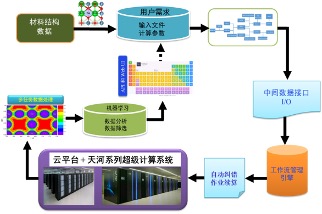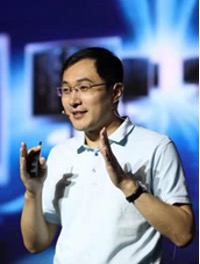CNMGE: the High-Throughput Computing Infrastructure
for Materials simulation and Big-Data Management
Xiangfei Meng*, Geng Li, Xiaodong Jian, Xiaoqian Zhu
National Supercomputer Center in Tianjin, Tianjin 300457, China
ABSTRACT: A high-throughput computing
(HTC) infrastructure is the key to accelerate materials discovery in the materials
genome engineering. Several efforts has been devoted to build the HTC
environment by computer and material researchers. National Supercomputer Center
in Tianjin, the most famous supercomputer in China, constructed a HTC
infrastructure for materials with the features of automatic workflow, high
concurrency and multi-scale calculation, named as the computational platform of
China Materials Genome Engineering (CNMGE).
The main features of CNMGE is automatic workflow,
high-throughput calculation, and multi-scale simulation. Technically, it
realizes secure access across the Internet, cloud platform and supercomputing
environments and develops a set of integrated software and hardware systems,
including workflow engine, data visualization and unified resource interface.
In terms of functions, the platform mainly includes two major parts:
high-throughput computing workflow and material data management and application
system. It provides users with the following functions: information overview,
tool supermarket, high-throughput computing, data management, data visualization,
material database, potential function database, and intelligent prediction.
At the same time, we are exploring the innovation
model of industry-academia-research collaboration. Firstly, we have organized a
series of online forums and training activities. More than 150 users from more
than 30 research institutions has registered CNMGE. Secondly, based on the platform,
we produce a lot of typical applications. In collaboration with Tianjin
University, we have developed a high-throughput calculation for the preparation
of W/Cu laminated metal composites, and prepared the first wall part of W/Cu
laminated metal composites for a super tokamak device at the Institute of
Materials Research, Hefei, Chinese Academy of Sciences; in collaboration with
Soochow University, we have conducted a high-throughput search and structural
optimization for the doping of copper-based metal clusters, and obtained the
best hydrogen production catalytic material structure. CNMGE is a national open
source platform, and its goal is to serve for the country, research
institutions and enterprises in the research and development of new materials
for collaborative innovation in industry and academia.

Keywords: high-throughput calculation; materials data management system; Tianhe Serial Supercomputers; automatic workflow.

Mr. Xiangfei Meng, Ph.D., is a researcher senior engineer of National Supercomputing Center in Tianjin, director engineer of "Big Data Processing Technology and Application" Joint Laboratory of National Development and Reform Commission, member of the Standing Committee of CCF High Performance Computing Committee of China Computer Society, vice chairman of Intelligent Medical Branch of China Artificial Intelligence Society, and vice chairman of the tumor Artificial Intelligence Committee in China Anti-Cancer Association. He is responsible for the R&D and cooperation of the "Tianhe" series of supercomputers, and his research interests include high performance computing technology, supercomputing, big data and artificial intelligence fusion platform construction and application, etc. He has been awarded several provincial and ministerial-level first and second-class science and technology progress awards as the first and main finisher, and has been awarded as a special-posted expert of the State Council, China's May 4th Youth Medal, and a leading talent of Tianjin's 131 talent plan innovation team. He has presided over the National Thirteenth Five-Year Plan key R&D projects, the National Natural Science Foundation of China, and the National High-Tech Service Industry Project.